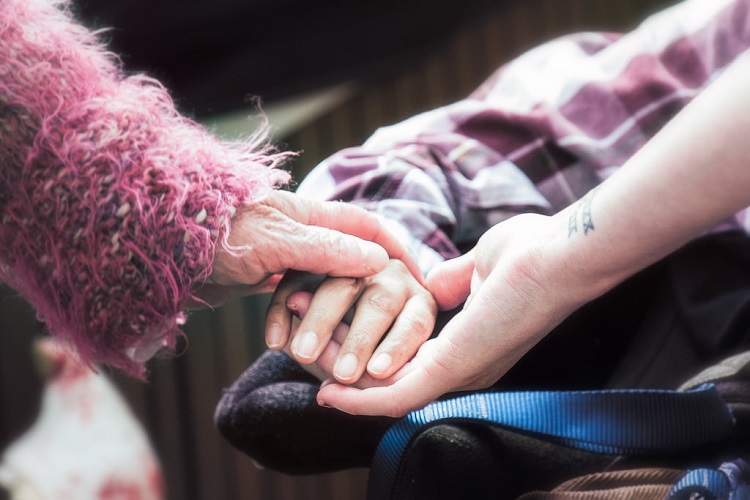Loving someone with an addiction is one of the hardest things in life to have to cope with. You don’t have to carry the burden and be alone in this stressful situation. It can be extremely difficult to see someone you love struggling. Naturally, we instinctively want to reach and help, but we don’t know how. It shows a true testament of your character to be there by their side through the most challenging of times. don’t make yourself go through it alone or suffer in silence. Understanding addiction can be a true learning process for everyone involved. This guide will show you just what to do when faced with these heartbreaking circumstances.
Image Source: Pexels
Do Your Research
Anyone can have an addiction, but some people are more susceptible to one than others. If you suspect a family member or loved one is going through an addiction, it’s important to know all the telltale signs and symptoms. More than often the person doesn’t recognize that they’re ill. Try observing their behavior over a number of weeks, without invading their personal space. Never try to fix a problem by yourself. Get a second opinion from family and friends, to see if they share the same concerns as you. If you’re still not sure then reach out to a mental health or substance abuse professional who will be able to give a clear indication of what’s going on.
Accept That It’s Not Your Fault
Sometimes it can be easy to blame yourself for not being able to change someone with an addiction. Hours of the day can be eaten up stressing and worrying about how to get through to them. It’s easier said than done, but you have to understand that ultimately the only person that can help them is themselves. You really have to accept that you can’t control the person or fix them, but you can support them every which way you know how. It’s also important to understand that it’s not their fault either, but you must do everything you can not to feed their addiction. You want to lead them down the right path, not further into helplessness, and you are certainly not responsible for their actions.
Look After Yourself
It’s easy for your physical and mental health to take a serious knock when dealing with someone with an addiction. It’s easy to put your loved one first, but it’s not ok if it’s at the cost of your mental state. The way to keep a good balance is by eating healthy, making time to see the people closest to you, and not being hard on yourself. Don’t forget to keep doing the things that you love and never internalize your feelings. We all have one life in this world, and sometimes it may mean mean being a little selfish at times. You may even need to create boundaries to protect your well-being. Never put yourself in a position where you could be facing violence and abuse.
Image From: The Blue Diamond Gallery
Seek Outside Help
Whether it’s through counseling or simply sharing how you feel with the closest people to you, it’s important to have an outlet for your emotions. People who you can trust not to judge your situation and give you honest and open advice. Never see it as weakness to open up to someone and ask for help. A one on one conversation may be the most effective option, where you could try mentioning rehabilitation services. Sometimes group interventions are the only way to get through to someone. Institutes such as Real Recovery Program will have the expert knowledge and facilities to provide help. One way to help indirectly is to leave information around the house with contact numbers of professional services. Don’t let yourself be burdened with all the responsibility yourself.
Never Give Into Manipulation
Of course there will be testing times when you’re pressured to act as an enabler for the person you love. This is when you have to have really strong willpower and not give in. You may get threats of blackmail or cursed at, but in the long term, you’ll be glad you didn’t give in. Helping someone and enabling them is definitely not the same thing. No matter how hard it is, tough love is the only answer in this situation. When you enable you’re just dragging them down and yourself with them. Someone has to be the stronger person, and that means setting an example, and showing you’re not weak.
Mind Your Approach
Addiction is of course a touchy and serious subject. You need to tread carefully on the issue. How you communicate to your loved one determines how they will act around you. The best approach is to never sound like you’re accusing them. Inside you can feel a turmoil of emotions, but expressing yourself through anger never works. As soon as they start to feel judged and confronted, you run the risk of the person you love turning their back on you. You want to avoid making them feel like they’re alone and misunderstood. The most effective way to communicate is to express concern and try to show them (in a non patronizing way) that they are ill. Most people in recovery state that it was the honesty of their friends and family that encouraged them to seek help, so don’t give up.
Image By: Flickr
Help Them Through Recovery
If that someone close to you has chosen to seek help, that’s fantastic news! It’s important not to withdraw completely and remain involved as they go through the recovery process. After all, you helped to get them there, which means you are a positive influence in their lives. They’re going to be experiencing all sorts of changes, from withdrawal symptoms to feelings of guilt. Ask them how their support group or treatment went, and keep on giving those helpful words of encouragement. Positivity is the key here, as relapses unfortunately can happen if a person’s mental state is still not strong enough. Inspire them whenever you can by showing them how far they’ve come and the bright opportunities the future holds for them. Let them know how proud you are that they have show the strength to overcome something so challenging.
What You Should Avoid Doing
In terms of what you shouldn’t do, try not to sound preachy or moralizing. It’s easy for someone with an addiction to be in denial, but you should never make excuses or lie for them. As harsh as it sounds, they need to know the facts and truth for their own good. Similarly, no matter how much you care, you shouldn’t shield them from the consequences of their behavior. They are responsible, not you, for turning their life around. Also, don’t expect to see them give up straight away, or bribe them in hopes of seeing results. Harboring guilt for their actions is also something you need to prevent. It’s easy to place the blame on yourself but it’s really not your fault. Most importantly, stay strong and don’t get sucked into the addiction yourself. If you have a weak personality, it’s better to distance yourself.
Don’t Let Fear Stop You
It’s understandable that you might not want to step in and get involved in a testing situation like drug addiction. You may feel that they might lash out at you, or resent you for it, but really, they’re crying out for help. You have to understand that this addiction is not the real them. Don’t brush the issue under the carpet because of your doubts and fears. Sometimes the only way for them to recover is for someone to step in and guide them down the right path. The truth is they’re probably more scared than you.
Set Boundaries
It can be extremely frustrating when someone with an addiction refuses to get help. You fear that if you’re too forceful they’ll pull away, but if stand there and do nothing, they’ll never recover. If they show no signs of stopping, explain that you’re on their side, but you’ve got to do what’s best for you. Walk away and allow them to realize the consequences of their actions. This doesn’t mean washing your hands of them completely, but it may give them the wake up call they so desperately need. Addiction is entirely mental. For someone to want to change, they need to hit rock bottom before they understand the seriousness of their problems.
Although there is no magic formula, your perseverance and strength through your support means more to your loved one than you’ll ever know. They might not even realize it at the time, but without you they might have sunk further into a black hole. Never be afraid to speak up and offer outside help. They may be in denial right now, but one day they could thank you for it. It’s a slow process, but your support means more than anything during these vulnerable times.





